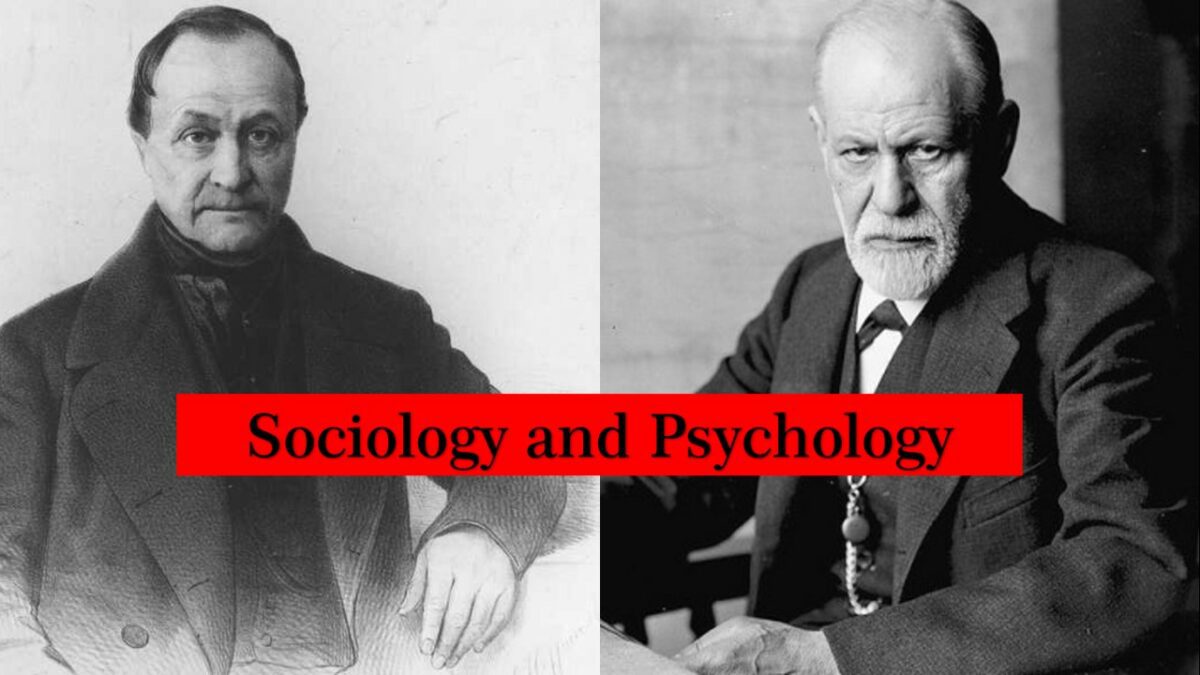In this article we will review the Difference between Psychology and Sociology . Psychology and Sociology are two broad sciences related to the study of human beings, wherein ‘psychology’ refers to the study of the human mind, i.e. it deals with what happens inside a person’s brain, in order to understand his reasons/behavior under different circumstances. In contrast, ‘sociology’ implies the study of human behavior in a group or society and the reasons for it.
Where psychology focuses on an individual, namely studying the individual, his behavior, thoughts, feelings and mental characteristics at a time. Sociology aims to analyze the behavior patterns of a group of people. It also studies the reasons that make them follow a particular religion, belief, culture, customs,
So, basically, psychology is about the ‘nature’ of a person, i.e. what you were born into, whereas sociology is about ‘upbringing’, i.e. what a person was raised with. Read the article below to the end to understand the difference between psychology and sociology .
Definition of Psychology
Psychology can be understood as the methodical research and study of mental processes, experiences and human behavior and the relationships between them, whether real or not. It is the study of a person’s mind, such as how it functions and influences behavior.
The term ‘psychology’ is a combination of two Greek words ‘psyche’ and ‘logos’ which mean ‘soul’ and ‘study’ respectively. In this way, psychology refers to the study of the soul. It analyzes three main aspects of human nature, namely:
- Experience: Some personal human experiences and privacy are studied by psychologists to understand one’s private world. This includes dreams, one’s conscious experiences at various phases of life and altered consciousness experiences, by means of medication or meditation.
- Mental Processing: It also studies the human mental processes in which the thoughts that occur in a person’s brain are read. In this study, a person’s internal mental activity is investigated, with their attitudes and behavior in certain situations. This includes the investigation of perception, thinking, learning and remembering, etc.
- Behavior: Psychology also studies a person’s behavior, which includes the analysis of basic reflexes, response patterns, and complex behaviors, either through direct observation or measurement through scientific instruments. Basically, a person’s behavior is reflected in his activities such as body language, gestures, facial expressions, when he responds to stimuli in certain situations.
When observing a person’s behavior, psychologists try to find out the processes that influence a person’s behavior. The process is represented in the image below:

Definition of Sociology
Sociology can be understood as a social science that systematically studies social relations, interactions, culture and behavior of a person in society. The subject area of sociology is not the individual, but seeks to look further, i.e. examine society, regarding certain associations or groups of individuals.
The term ‘sociology’ is a combination of the Latin word ‘socius’ and the Greek word ‘logu’, meaning ‘associate or associate’ and ‘study’. So, sociology refers to the study of friendship or human relations.
Sociology studies how people in a group interact with each other and how a person’s behavior is determined by social groups, categories, like age, class, gender, etc., and institutions, i.e. religion, caste, education, politics etc. scientific studies, as in it investigates and analyzes social reality using logical methods, considering verifiable evidence and interpretations. Furthermore, social status, movement, stratification and change, are also studied in this discipline.
Difference Between Psychology and Sociology
The differences between psychology and sociology discussed above can be summed up in the following points:
- Psychology is the study of humans in relation to their experiences, mental well-being and behavioral patterns. On the other hand, sociology is the science of human association, which studies the actions of individuals in a social context.
- Psychology is a specialized science that studies the individual mind and its functions, which direct and control behavior. Sociology is a general science in which sociologists analyze the structure of groups, societies and institutions and the way people interact.
- When it comes to subject areas, psychology studies the human mind and behavior, whereas sociology studies the behavior of a person when he is in a group or in the midst of people.
- In psychology, psychologists tend to examine and analyze one person at a time. In contrast, in sociology, sociologists analyze society or groups as a whole.
- In psychology reading a person’s mind and the reasons for his behavior in a certain way is an experimental process. On the other hand, in sociology, sociologists observe the behavior of individuals in society and the way society views, beliefs and cultures, etc. Influence someone.
- While psychology deals with human emotions, sociology deals with human interactions.
- Psychology assumes that a person’s mental characteristics govern his behavior. In contrast, sociology assumes that individuals are significantly influenced by society, which regulates individual behavior.
Conclusion:
Social Psychology is a branch of psychology, which studies the impact of people on the thoughts, feelings and behavior of individuals. Psychology tends to study the individual, in terms of his mental characteristics to find out the reasons for his behavior in a certain way. On the other hand, psychology is concerned with the origin, development and structure of human society.

